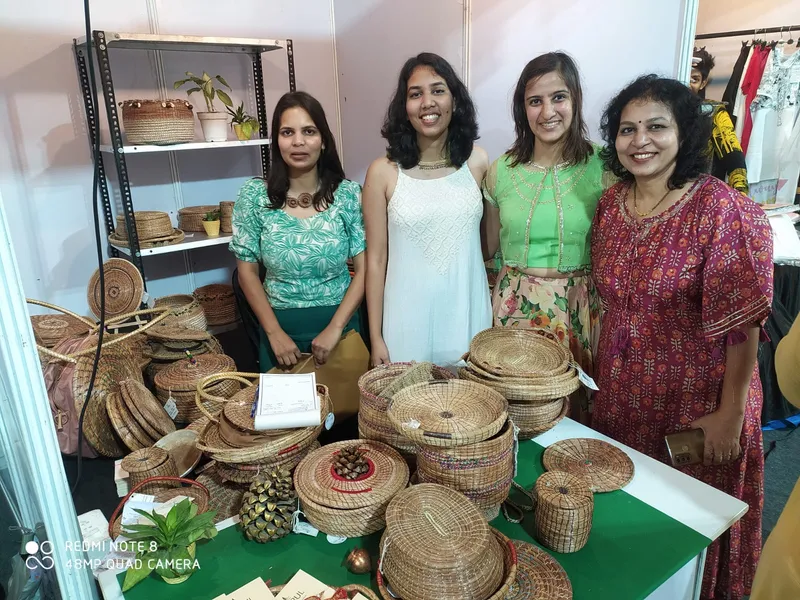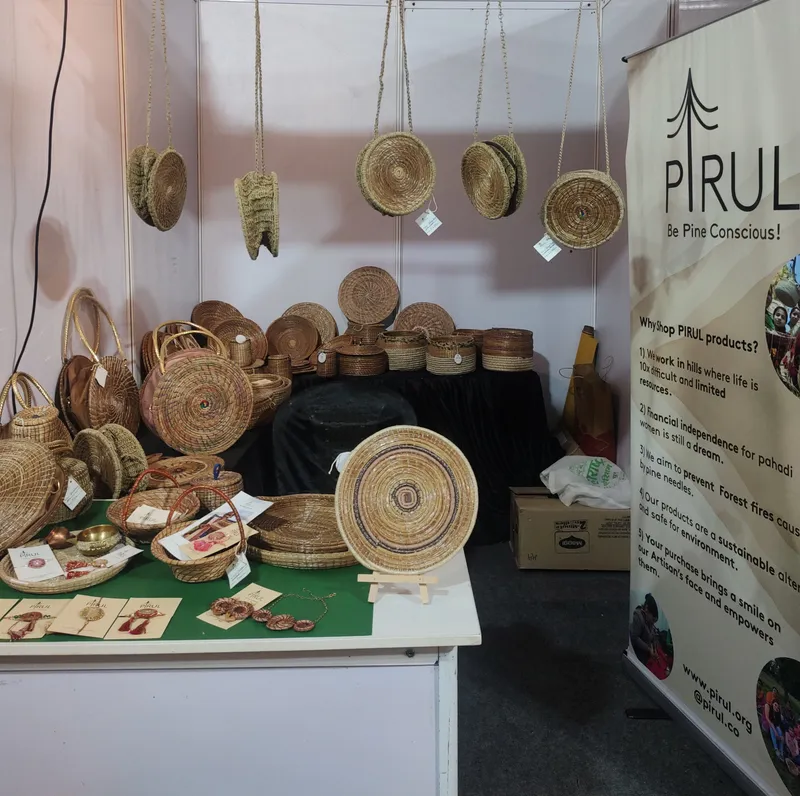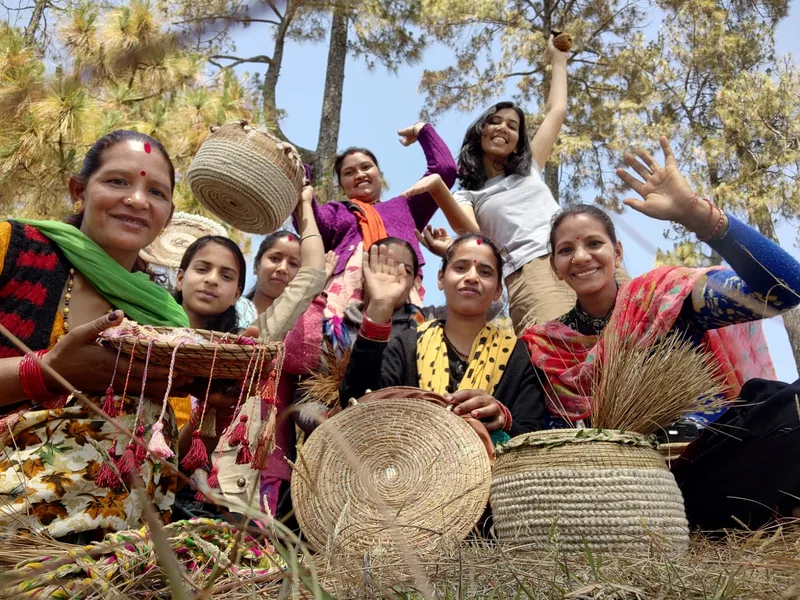From forest to our houses: This Uttarakhand startup helps women earn livelihood from pine needles
PIRUL Handicrafts, started by Nupur Poharkar in 2021, makes artefacts from pine needles and gives women a source of livelihood in Uttarakhand.
Life moves slowly in the rugged terrains of Khetikhan village in Uttarakhand. For Manju, each day brings a plethora of activities—from running errands to household chores—but it’s far from over.
Once she finishes her usual work, Manju sits down to make roti boxes, trays, pen stands, etc.—all from pine needles that she collects from the forest two to three times a week—for PIRUL Handicrafts. She earns around Rs 7,000 a month.
“There were days when I have earned around Rs 15,000. Because of this income, I can support my children's education and contribute to the house rent,” she tells HerStory.
Manju is among 100 women who work at Handicrafts, founded by Nupur Poharkar in 2021, which makes artefacts from pine needles. In the local dialect of Uttarakhand, 'Pirul' means using pine needles to make products. To date, the startup has sold about 8,000 products.
Uttarakhand and Himachal Pradesh have an abundance of pine trees that shed their resin-rich, highly flammable needles onto the forest floor. They also decompose slowly in the environment and are responsible for increasing the surface run-off of water and decreasing the groundwater table.
“At PIRUL Handicrafts, we not only aim to upcycle pine waste into different products but also strive to empower women by offering livelihood opportunities,” Poharkar says.
The inner calling

Nupur Poharkar (extreme left) and Sharvari Poharkar (to her right)
Poharkar, hailing from Nagpur, believes the desire to work for society runs in her genes, as growing up, she has seen her father, Dr Ajay Poharkar, work as a veterinary doctor.
She recalls when her father was transferred to a remote village in Maharashtra, riddled with naxal activities, which lacked electricity and drinking water. He mobilised the villagers, trained them in cattle rearing, and got them government subsidies. At present, he runs an NGO for animal welfare in Nagpur.
So, it was an obvious choice for Poharkar to follow her “inner calling” of joining the social development sector after she completed her veterinary degree.
She stumbled upon the SBI Foundation’s YSF fellowship programme in an advertisement and enrolled in it. She soon started working with the BAIF Institute for Sustainable Livelihoods and Development in Khetikhan, Uttarakhand.
With pine forests everywhere—as long as the eye can see—Poharkar came across a forest fire in the backyard of a house caused by pine needles, which burnt the grass used for cattle rearing.
The incident left Poharkar thinking that nothing much has been done to solve the issue of forest fires caused by pine waste. Meanwhile, the responsibility of agriculture, cattle rearing, and household chores falls solely on the shoulders of the women, with men migrating out of the state for better income opportunities.
However, a change in cropping patterns, erratic rainfalls, and increased menace of wild boars have left women with a meagre income from agriculture.

PIRUL Handicrafts offers planters, earrings, serving trays, and store boxes, among many other products.
She tried convincing women to make products out of pine needles during her one-year fellowship in Uttarakhand. However, most women did not pay any attention to her. “Most people were ashamed to pick up the pine needles as they used to consider it waste,” she recalls.
A determined Poharkar visited the village, trying to make personal connections with the women while showcasing the products she made by herself. In fact, she also collected pine needles with them.
Eventually, young girls got interested in the idea, and in two months, PIRUL Handicrafts started getting orders and more joined the initiative. In 2021, Poharkar’s younger sister, Sharvari Poharkar, also joined the startup, which had started with four women.
The same year, the startup started making rakhis from pine needles, which became popular. It also received a corporate order from a pharma company Virbac Animal Health for 5,000 tea coaster sets, which set the ball rolling for the business.
Promoting livelihood opportunities
PIRUL Handicrafts offers planters, earrings, serving trays, and store boxes, among many other products. Its home decor products are priced between Rs 1,000 and Rs 3,000, lifestyle products between Rs 1,500 and Rs 1,800, while fashion items start from Rs 250.
“Our target customers are upper middle class and the luxury market,” Poharkar says, adding that the startup has upcycled over 20,000 kg of pine waste to date.
Bootstrapped since its inception, it sells its products primarily through Instagram and exhibitions and in 12 offline stores in Delhi, Hyderabad, Bengaluru, Mumbai, and more. It also gets bulk orders from local government bodies and corporates.

The startup has upcycled over 20,000 kg of pine waste to date.
PIRUL Handicrafts works with women from Khetikhan and other remote villages near the Nepal border and Almora district. It distributes the accessories like threads to the women, while the women collect the pine needles from the forest.
“Travelling to these remote villages to deliver accessories and collect finished products is a significant challenge due to limited cab availability. It consumes a considerable amount of time and money,” she adds.
Kiran, who hails from Khetikhan village, has been working with the organisation for the last two years. Earlier a housewife, now she earns between Rs 7,000 and Rs 8000 per month.
“I do my household chores and sit at work. Not only am I earning a decent amount of income through my work, but it also gives me a purpose,” she says.
Recently, the organisation won a grant of Rs 9 lakh at SBI YFI Sahyog - The Pitch Fest, organised as part of the SBI Youth for India (YFI) Conclave 2024—the CSR arm of the State Bank of India.
“We will utilise the Sahyog grant in enhancing our marketing efforts and scaling up our enterprise. It will help create a greater impact by replicating our business model in many more villages in the hills of Uttarakhand and empowering the locals with livelihood opportunities,” Poharkar says.
Edited by Suman Singh







